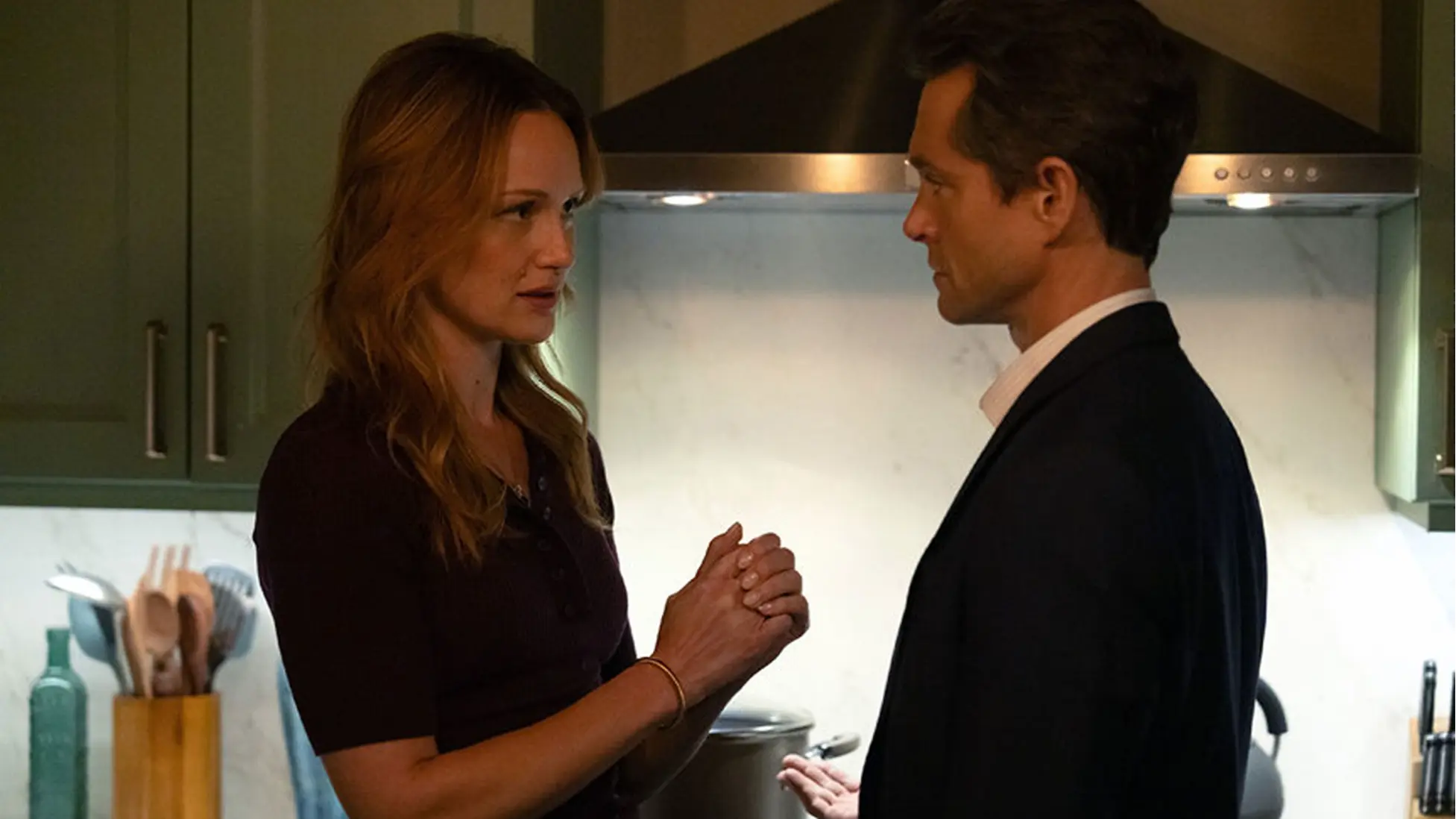Law & Order season 25 episode 3 recap: White Lies makes Price expose a CEO’s Alzheimer’s to nail a desperate dad
-
 Kerry Bishé as Grace Hall with Hugh Dancy as A.D.A. Nolan Price in Law & Order season 25. Photo via NBC.
Kerry Bishé as Grace Hall with Hugh Dancy as A.D.A. Nolan Price in Law & Order season 25. Photo via NBC.Law & Order season 25 episode 3 opens on Wall Street and never stops raising the stakes. In White Lies, a “bulldog” investor named Tom Hardiman is shoved into Midtown traffic the same day he moves to oust a pharma chief. Detectives Vincent Riley and Jessica Brady dig through rival deals and dead-end alibis until the trail leads to WellPoint Therapeutics and a takeover that could kill the research a scientist’s child needs to survive.
The prosecutors face a harder truth. Norman Munson, WellPoint’s respected CEO, played by Tom Irwin, is secretly battling Alzheimer’s. Executive ADA Nolan Price decides the only way to prove motive is to put that illness on the record. The cost lands on Kevin Goodall, a senior researcher portrayed by Eric Ladin, whose daughter is in a Batten disease trial. Katrina Lenk appears as the defense attorney who fights the plea until the courtroom turns. Directed by Milena Govich and written by Jennifer Vanderbes, Law & Order season 25 episode 3 frames justice as a choice that leaves scars.
Law & Order season 25 episode 3 recap: Case file-Hardiman’s death, the takeover and the WellPoint trail
Law & Order season 25, episode 3, starts with Hardiman being shoved in front of a cab, a deliberate act that sends Riley and Brady into a maze of enemies, including hospital cutbacks and hostile bids. Surveillance and meeting logs tie Hardiman to WellPoint, where he has muscled into a board seat and pushed to remove CEO Norman Munson. That meeting matters because on the day of the murder, Munson and Hardiman are seen arguing as nervous staff hover nearby. The case narrows to Munson’s inner circle and then to Kevin Goodall, a brilliant researcher who would lose both his job and his daughter’s trial medication if Hardiman’s plan goes through. A suppressed DNA lead means the state must prove motive, not mechanics, which shifts the episode into its moral engine. Price said,
“We do not get to rate victims in the search for justice.”
A line that sets the tone for what comes next. Law & Order season 25 episode 3 keeps returning to that line as the team weighs a conviction against a man’s dignity and a company’s mission.
The second movement of Law & Order season 25 episode 3 turns on a bind only this franchise would weaponize. If Price protects Munson’s privacy, Goodall can walk. If he exposes Munson’s condition, the jury can see why Goodall killed, and the defense has to blink. The show allows the investigation to breathe while building the human stakes around Goodall’s daughter and the WellPoint Batten trial, which a takeover would likely gut. In court, Price needs a clean chain from Hardiman’s push to Goodall’s panic. He calls Munson, who is steady until he is not, and the room goes still. Price asks,
“How did you get to court today?”
A simple question that reveals too much and forces the defense to reassess in real time. Law & Order season 25 episode 3 makes the jury feel the risk that the truth can break the very thing it seeks to protect.
Trial turns on motive: Batten-trial stakes, Munson’s diagnosis and Price’s gamble
Inside Law & Order season 25 episode 3, the motive is not money. It is a father’s calculation under pressure. Price and Samantha Maroun learn that Hardiman planned to weaponize Munson’s Alzheimer’s to force him out, which would clear the path for the takeover and slash research funding. Once DNA is ruled out, the case becomes a referendum on why Goodall acted. When Munson’s decline surfaces in open court, Goodall reads the room and the future of WellPoint’s trials. Price remarked,
“He was willing to give up his freedom, his whole life, for his daughter… for the greater good.”
That is Goodall’s plea in one sentence, and it lands because the show has already tied his motive to a concrete outcome for a sick child. Law & Order season 25, episode 3, uses that choice to transition from a corporate murder to a story about medical ethics and what a prosecutor will do to prove a point.
Ending explained: Why Goodall pleads and what Price’s choice costs
The ending of Law & Order season 25 episode 3 is clean on paper and bruising in practice. Goodall accepts a plea after Munson’s testimony makes the motive undeniable, which gives the state a conviction and spares a public unravelling that could crater WellPoint. The victory does not feel like one. The episode leaves Munson’s future uncertain and the trial program vulnerable, which is the point. The law proves why a man killed and then asks viewers to live with how that proof was obtained. The case closes with a father in prison, a company exposed, and a court that heard the truth only because a prosecutor was willing to use it. Law & Order season 25 episode 3 ends on the franchise’s classic note. Justice is delivered. The cost is left on the table for everyone else to count.
Stay tuned for more updates.